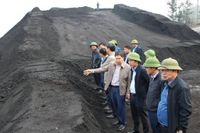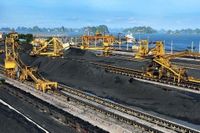The Vietnam National Coal and Mineral Industries Holding Corporation (TKV) is embarking on an ambitious strategy to transform its operations, with the goal of establishing itself as a robust economic group pivotal to Vietnam's energy security. This initiative underscores TKV's commitment to achieving sustainable development aligned with the nation's pledge to reach net-zero emissions by 2050. By investing in key projects and integrating advanced technologies, TKV aims to enhance its production capabilities and ensure the responsible management of finite resources.
As part of its strategy, TKV is focusing on digital transformation and the implementation of advanced science and technology. This includes the application of enterprise resource planning systems, automation, and digital solutions to increase efficiency across its operations. TKV's plans include significant investments in major projects such as the Tan Rai and Nhan Co alumina projects, which are set to yield a combined annual capacity of 2.0 million tons of alumina.
Investment is also expected to flow into the Bokai-Alumina-Aluminum project in Dak Nong province, targeting a production output of 2.0 million tons of alumina per year. Additionally, TKV is committed to the development of an Aluminum Electrolysis project in Lam Dong province, projected to produce 0.5 million tons of aluminum annually. These initiatives are part of TKV's broader aim to make Dak Nong the national center for alumina production by 2030, fundamentally enhancing the region's economic potential.
In line with the government's direction, TKV has been tasked with improving its processing and exploration capabilities consistent with favorable geological conditions. The organization is prioritizing the sustainable exploration of coal resources while simultaneously divesting from underperforming subsidiaries. This shift is being undertaken to help reinforce TKV's strategic focus on high-impact industrial activities.
Emphasizing environmental sustainability, TKV is also investing in the exploration and development of advanced mining technologies. This includes innovations to reduce environmental impacts and heighten safety standards within its operations. As part of enhancing its operational proficiency, TKV is seeking partnerships and research collaborations to identify suitable technologies for geological exploration of complex geological areas.
The company's commitment to innovation is not just limited to coal and alumina but also extends to mineral processing and chemical products. TKV is developing explosive products and raw materials to ensure operational continuity and create value across its service offerings. The commitment to expanding its product portfolio is reflected in plans to meet increasing domestic demand through efficient production processes and an enhanced distribution network, which also aims to reach out to international markets like Laos, Cambodia, and Indonesia.
In the ever-evolving landscape of the energy and industrial sector, TKV’s strategy is designed to align itself with the principles of a circular economy, linking coal, electricity, and metallurgy production for synergistic benefits. The company aims to integrate renewable energy sources and minimize toxic chemical use while maximizing the recycling of wastage into new industrial inputs.
With the adoption of new technologies and innovations that meet international standards, TKV is working to enhance its operations, ensuring not only robust economic growth but also environmental stewardship. The strategic realignment within TKV seeks to elevate its status in the mining and energy sectors further, driving Vietnam’s upward trajectory towards sustainable industrialization.
The ambitious pathways set forth by TKV are paving a new path for Vietnam's mining and industrial sectors, intending to create a model that can evolve over time and respond adeptly to both domestic and global challenges while maximizing resource use efficiency. Developed plans underscore a comprehensive vision focused on exploration, application of technology, factory construction, and expansive production of alumina and aluminum—integrating sound economic strategy and environmental responsibility.





